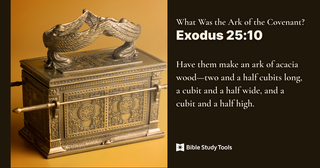
- Recent Translations
- All Translations
Exodus 25:29
Share
Settings
Images for Exodus 25:29

Exodus 25:29 in Other Translations
Exodus 25:29 Meaning and Commentary
And thou shall make the dishes thereof
On which the shewbread loaves were set. Jarchi says they were of the form of the bread, and that there were two sorts, one of gold, and one of iron; in the iron one the bread was baked, and when they took it out of the oven, they put it into the golden one until the morrow of the sabbath, when they set it in order upon the table; and that form is called "Kaarah", which we render a dish:
and the spoons thereof;
or rather "cups"; these, Jarchi says, were censers, in which they put the frankincense; and there were two of them for the two handfuls of frankincense, which they put upon the two rows of shewbread, ( Leviticus 24:7 ) ( Numbers 7:14 ) . Josephus F24 calls them vials, and says, that on the bread were put two golden vials full of frankincense:
and the covers thereof, and the bowls thereof, to cover withal;
the one to cover the bread, and the other to cover the frankincense; or all the above said vessels were to cover the table, and with them all it must be pretty well covered with vessels. The Jews give a different account of these two last, and of their use, which we render "covers" and "bowls": the first of these Jarchi says were like the half of hollow reeds divided to their length, made of gold; and three of them were laid in order on the top of every loaf, so that one loaf rested upon these reeds; and they separated between loaf and loaf, so that the air could come in between them, and they did not become mouldy; the latter, he says, were props like stakes of gold standing on the ground, and they were higher than the table, even as high as the rows of bread; and they were forked with live forks, one above another, and the tops (or ends) of the reeds, which were between each loaf, rested upon these forks, that so the weight of the upper loaves might not be too heavy for the lower ones, and break them. A like account of them Ben Melech gives, and observes, that some make the first word to signify the props, and the second the reeds; and so they are interpreted by Maimonides F25; and, according to the Misnah F26, the props were four, and the reeds twenty eight. According to the Septuagint version, these were vessels used in libations, or drink offerings; and the last clause is rendered in it, "with which thou shall pour out": wine or oil, and so in some other versions; but it will be difficult to find any use for such libations or drink offerings at this table.
F24 Antiq. l. 3. c. 6. sect. 6.
F25 Pirush in Misn. Menachot, c. 11. sect. 6.
F26 Menachot, ib.
Exodus 25:29 In-Context
Cross References 1
-
1.
Numbers 4:7